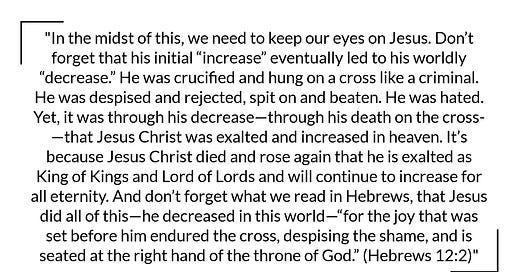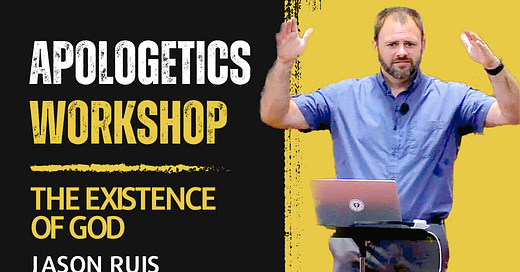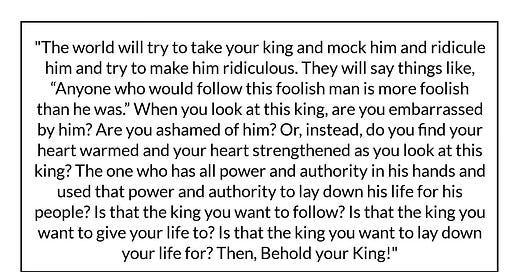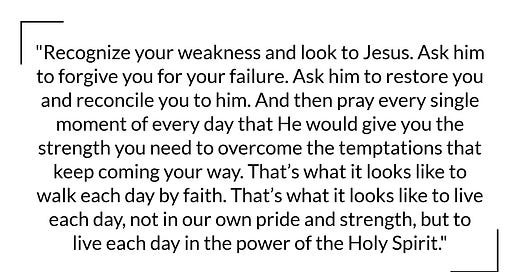
John the Baptist’s Final Testimony
[Read John 3:22-30]
There’s a show that Rachel and I have enjoyed watching over the years called “The Office”. For the most part, it’s a pretty good show that doesn’t get super inappropriate but is pretty funny. One of the things this show is known for is how awkward the manager is. He has no social awareness and is always doing things that make people cringe and feel really uncomfortable. I have friends who can’t watch the show because of how uncomfortable Michael Scott makes them.
One of the most uncomfortable moments in the entire show is when one of the employees gets married. She invites her boss to be part of the wedding, not because she likes him or appreciates him, but because she knew it would get her some bonus points and some extra vacation time. But Michael takes this invitation and runs with it way beyond what is appropriate.
He repeatedly tries to make the wedding all about him. The bride’s father is in a wheelchair, so Michael Scott is assigned to push him up the walkway alongside the bride. He takes this to mean that he is also giving away the bride—kinda like her father. But partway up the walkway, he waves for Michael to stop pushing him, gets up out of his chair, and walks his daughter down the aisle. Everyone is shocked and moved by this moment, except Michael Scott. He’s frustrated because this guy stole his thunder. He loudly yells, “You’ve got to be kidding me!” and then drags the wheelchair down the aisle, banging it on every pew along the way—like a little kid throwing a temper tantrum. During the vows, he jumps up and tries to introduce the new couple before the pastor can do it—but get’s the timing wrong…and then tries again…During the wedding reception, he walks up and takes the mic from the best man, and begins to give his own speech that is weird and awkward and inappropriate. Eventually, the groom gets up, grabs him by the shirt and throws him out of the wedding.
Now, what about that scene makes it so awkward and uncomfortable? I mean, you guys were squirming in your seats just listening to it, imagine watching it happen, or being at the wedding itself. It’s so awkward because everyone knows that the wedding is about the bride and groom. The spotlight is supposed to be on them—not on anyone else. So, when we see someone else repeatedly trying to put the spotlight on themselves at a wedding, things get really awkward and feel inappropriate.
And here’s the catch, even though we instinctively know this is the case with a wedding, we don’t act this way with the rest of our lives. At a wedding, we know that the spotlight is not supposed to be on us, but we want the spotlight on us in other areas of our lives. We intentionally act and speak in ways that try to make sure everyone is keeping their eyes on us and watching us and thinking about us. But what if this life was supposed to be more like a wedding? What if we’re not supposed to have the spotlight on us in this life, but the spotlight is supposed to be somewhere else? What if we’re going through life like Michael Scott at the wedding, constantly trying to make things about us—trying to get people’s eyes on us—all the while making everyone around us really awkward and uncomfortable?
We see this beginning to happen in this passage with John’s disciples. We read, “After this Jesus and his disciples went into the Judean countryside, and he remained there with them and was baptizing. John also was baptizing at Aenon near Salim, because water was plentiful there, and people were coming and being baptized (for John had not yet been put in prison).” (John 3:22–24, ESV). In many ways, this is just setting the scene for the rest of the story, but there are a few things that we need to talk about here before we move on. First, this passage says that Jesus was baptizing, but we need to make sure we understand this in the context of the rest of this gospel. A few verses later, at the beginning of chapter four we read, “Now when Jesus learned that the Pharisees had heard that Jesus was making and baptizing more disciples than John (although Jesus himself did not baptize, but only his disciples)…” (John 4:1–2, ESV). So, later John clarifies that Jesus himself wasn’t doing the actual baptizing, his disciples were doing the actual baptizing, but since they were his disciples, people were referring to Jesus as baptizing people. It’s kinda like when people talk about a coach winning a game when they really weren’t the one’s playing the game. They still get the credit for doing so. It’s the same here with Jesus.
The second thing we need to recognize here is that is says people were still going to John to be baptized: “John also was baptizing at Aenon near Salim, because water was plentiful there, and people were coming and being baptized” (John 3:23, ESV). And this is written in a way that says that people were continually coming and being baptized by John. So, we’re given the picture that there’s still a steady stream of people going to John to be baptized at the same time that people are also going to Jesus to be baptized.
And this leads to some discussion. We read, “Now a discussion arose between some of John’s disciples and a Jew over purification.” (John 3:25, ESV). I’ve already mentioned how John was shaking things up through his baptism—basically saying that Jews need to repent, be cleansed, and believe in order to be true Jews. Now, there were two people doing this—John and Jesus. That’s gonna cause some problems and bring up some questions about what’s going on and cause people to wonder about what all of this purification means. Why do all these people need to be purified?
But here’s the kicker of this entire interaction—here’s what John’s disciples get out of this conversation with someone about purification. They come back to John and say, “Rabbi, he who was with you across the Jordan, to whom you bore witness—look, he is baptizing, and all are going to him.” (John 3:26, ESV). I find that interesting. They get into a conversation with someone about purification—most likely the conversation was about the meaning and need of John and Jesus’ baptism—and here’s what they get from the conversation: There’s someone else baptizing and people are going to him instead of our leader, John.
Not only that, but then when they present this to John, they lie, don’t they? They say EVERYONE is going to Jesus to be baptized. EVERYONE. We know that’s not true because we just read that people were still streaming to John to be baptized. Now, I don’t know if they were intentionally lying, but I know this: when we become filled with frustration and jealousy and envy, we often exaggerate. EVERYONE’s life is better than mine. EVERYONE has better things than I do. EVERYONE is making more money than me. EVERYONE. So, I think this level of exaggeration from John’s disciples betrays that they are envious and jealous of Jesus’ ministry. They are worried that their master is beginning to lose his power and prestige and authority. They are worried that they will lose their power, prestige, and authority right along with him. So, they bring their concerns to John.
And John rebukes them. I want to explain this by talking about the second thing he said, first. He tells his disciples, “You yourselves bear me witness, that I said, ‘I am not the Christ, but I have been sent before him.’” (John 3:28, ESV). They should know this by now. From the beginning John has been telling people that it’s not about him. He’s not the Messiah and they should stop looking at him and trying to make this about him. That’s not his job. God sent him as a witness—someone who points away from themself to Jesus Christ. And he’s been saying that to everyone from the beginning of his ministry. Why don’t his disciples understand?
He tells us when he rebukes his disciples: “A person cannot receive even one thing unless it is given him from heaven.” (John 3:27, ESV). They will not understand this—or anything else—unless it is given them from heaven. That’s why they are envious and jealous and worried about people going to Jesus to be baptized rather than John.
To put a stronger point on this, it’s important to recognize that these disciples didn’t leave John to follow Jesus, but some did. Remember, that story we read a few weeks ago from the middle of chapter one? John says, “Behold the Lamb of God who takes away the sin of the world!” and two disciples leave him to follow Jesus—Andrew and most likely John the Gospel writer. But these disciples heard John say that and a BUNCH of other things, and they didn’t leave to follow Jesus, they stayed with John. They did this because they didn’t actually believe the words that were coming out of John’s mouth and they didn’t believe that Jesus was the Messiah. The only way they could believe any of this is if they received it from heaven because you cannot even receive ONE thing unless you receive it from heaven.
That’s been the theme of this entire chapter, hasn’t it? What did Jesus tell Nicodemus? Why wouldn’t Nicodemus receive Jesus’ testimony? He couldn’t receive anything unless he was born again by the power of the Holy Spirit—unless he received it from Heaven. Now John is saying the same thing to his disciples. By saying these things, by looking upon Jesus with envy and jealousy and frustration, they are showing that they don’t actually believe in Jesus—they haven’t received Jesus—and they haven’t received Jesus because they can’t receive anything unless it has been given to them from heaven.
John goes on to remind his disciples of his goal and purpose in life by using an analogy. He says, “The one who has the bride is the bridegroom. The friend of the bridegroom, who stands and hears him, rejoices greatly at the bridegroom’s voice. Therefore this joy of mine is now complete.” (John 3:29, ESV). John tells his disciples that his goal was never to be a Michal Scott, trying to get everyone’s eyes on him at the wedding. That’s inappropriate and awkward and dishonoring to the bride and groom. Rather, his goal was to be the best man—whose job is to make sure that the bride and groom shine, whose job is to make sure that everyone’s eyes are on the bride and groom. And, as the best man, he does not find joy in having other people look at him, he finds his joy in having everyone keep their eyes on the bride and groom. He finds joy if everyone walks out of the wedding talking about the bride and groom and completely forget who the best man was. That’s where his joy is and that was John’s calling.
And so John says, “He must increase, but I must decrease.” (John 3:30, ESV). This is the way it MUST be because this is the reason God sent John into the world—as a witness who will slowly fade into the backgrounds as Christ is exalted more and more. It was never about him in the first place. It was never about him drawing people to himself. It was never about fame and power and authority and prestige—like his disciples had hoped for. It was always about doing what he could to make sure Jesus Christ was exalted and lifted up—that all eyes would be on Jesus Christ (the groom)—and that they would eventually forget that John even existed.
He would slowly fade away and he would find tremendous joy in doing this because this is the reason God sent him into the world. Now that he saw people leaving him and going to Jesus, John knew that he had completed his mission, he had finished the race that God had given him. He knew that he would hear these words from God, “Well done, good and faithful servant…Enter into the joy of your master.’” (Matthew 25:21, ESV). So, he not only looked forward to entering the future joy of his master, but he found joy in being a good and faithful servant who has done what the Lord called him to do.
There’s so much in this for us to learn. I think it would be wise for each of us to have “He must increase, but I must decrease.” (John 3:30, ESV) written on our bathroom mirror and on our phone lock-screen and on our rearview mirror and on the door to our office and, and, and. We need this reminder so much because we live in a world that continually encourages us to say, “I must increase and they must decrease.” We live in a world that is continually striving for power and authority and prestige and wealth—a world where we do not think we can find joy by decreasing, only by increasing. We live in a world that is telling us that we need to do whatever we can to get the spotlight on us, get people’s attention on us, help people to see us. Yet, as a result, many of us are going through life like Michael Scott at a wedding—awkward and inappropriate, causing people to feel uncomfortable, missing the entire point of what is happening AND living with no joy as a result.
This is not how we were created to live and act in the world—that’s why it’s awkward and lacking joy. We were not created to live in the world like we’re the center of the universe or the center of attention. We have been created to live more like John—our whole lives as witnesses, pointing away from us to Jesus Christ. We have been created to live in this world like a best man, whose only goal is to make sure that people’s eyes are on the groom—Jesus Christ—and they completely forget about us as we slowly fade into the background. That’s our mission. That’s our purpose.
And when we fulfill that purpose and mission, we will find joy—a joy that is complete. I think that’s really important for us to understand in all of this. By decreasing and fading into the background, we are not actually losing anything. We are actually gaining a complete, fulfilled joy that will not come from anywhere else. We’re actually gaining the joy that we were seeking in all of the wrong places because we’re finally living the way God has created us to live, we’re no longer living like Michael Scott at a wedding, but like John the Baptist, watching Jesus continually increase as we slowly fade into the background so that people forget who we are because they are so enamored with Jesus Christ—that’s true JOY.
You won’t find that kind of joy anywhere else on this earth. We are now living in a culture that no longer thinks being a Christian is a good thing—more like a dangerous thing. You will not “increase” in this world because you are a Christian. If anything, you will “decrease” for being a Christian as culture continually cancels us and pushes us into the background. Are we okay with that? Can we still find joy in that?
In the midst of this, we need to keep our eyes on Jesus. Don’t forget that his initial “increase” eventually led to his worldly “decrease.” He was crucified and hung on a cross like a criminal. He was despised and rejected, spit on and beaten. He was hated. Yet, it was through his decrease—through his death on the cross—that Jesus Christ was exalted and increased in heaven. It’s because Jesus Christ died and rose again that he is exalted as King of Kings and Lord of Lords and will continue to increase for all eternity. And don’t forget what we read in Hebrews, that Jesus did all of this—he decreased in this world—“for the joy that was set before him endured the cross, despising the shame, and is seated at the right hand of the throne of God.” (Hebrews 12:2, ESV).
This is a reminder to us to keep our eyes on Jesus who decreased in this world and found joy in the midst of it. Jesus found joy in fulfilling his calling here on earth—even if that meant he would be despised and rejected. It didn’t matter because he was doing what his Father had given him to do. Jesus found joy in the midst of suffering and “decrease” here on earth, because he saw the joy that was set before him—a greater joy than this world has to offer.
So, as we go out into the world around us, let us not live and act like Michael Scott at a wedding, trying to get everyone’s eyes on us, always trying to exalt ourselves. Rather, let’s go out into the world like the best man, living and acting for the glory of someone else—Jesus Christ. Finding joy when people stop giving us glory and begin giving glory to Jesus Christ. Finding joy in fulfilling the calling that God has placed on our lives—longing to hear the words, “Well done, good and faithful servant…Enter into the joy of your master.” (Matthew 25:21, ESV).









